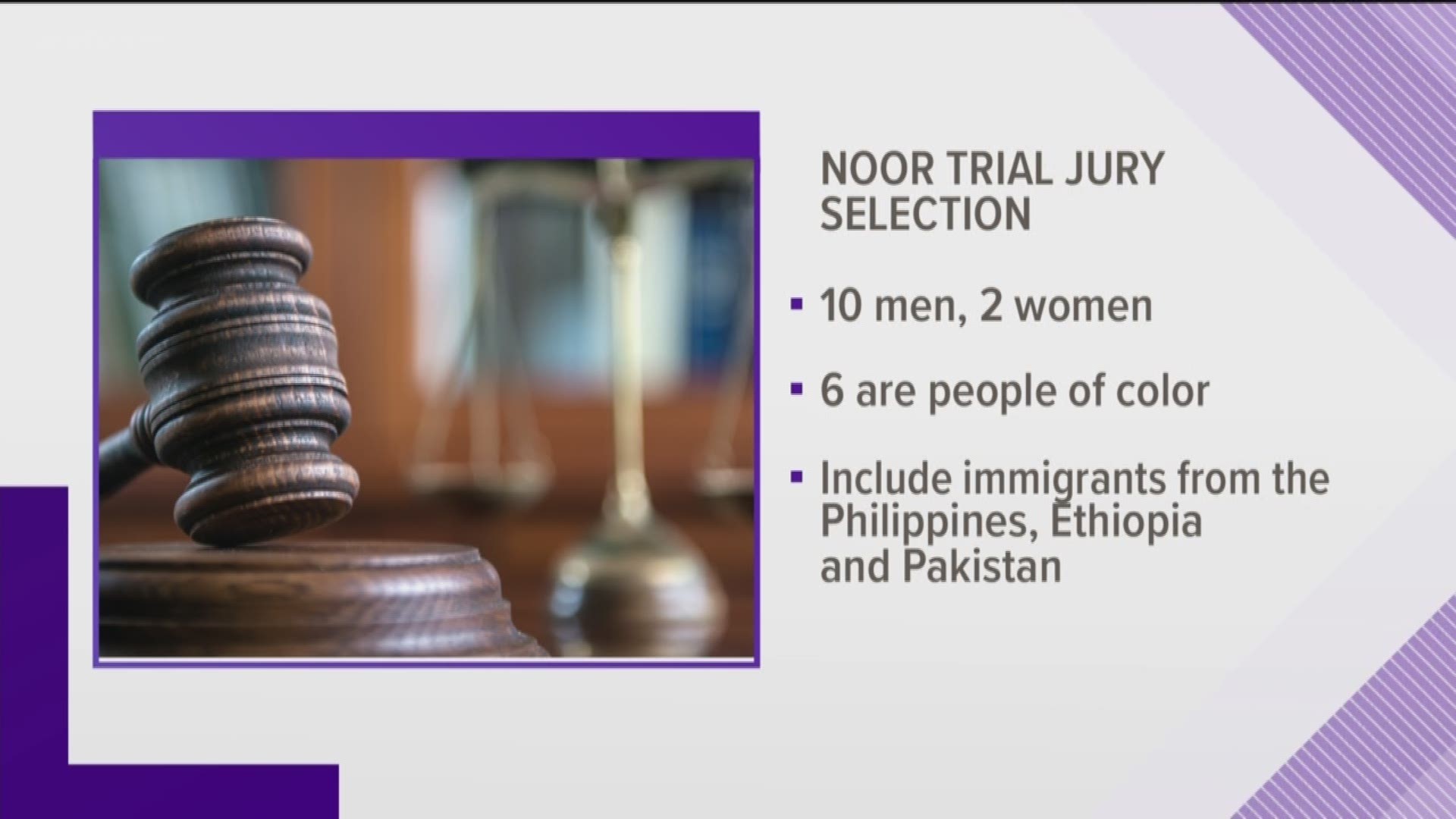MINNEAPOLIS — A jury of 10 men and 2 women, along with 2 men and 2 women serving as alternates, will hear the evidence in Mohamed Noor's trial in the shooting death of Justine Damond.
RELATED: Jury set in trial of Mohamed Noor
Here is a summary of each of the people serving on the jury.
(Note: Jurors were numbered when they were brought into court and their names were never shared in open court.)
- Young white man who works at a local grocery store. He started as a cashier and worked his way up. When asked about the stress of dealing with customers as a cashier, he said, "I'm kind of non-emotional." When he first saw Noor, he said he had a good idea what case this was. Juror #2's father was a police officer.
- Native American man who works as a civil engineer. On his questionnaire, Juror #3 said he might give police more credibility because he was taught at a young age to trust law enforcement. But when questioned, he said he would listen to each witness and be fair. He said he knew the "basics of the case" prior to coming to court.
- White man who is a self-described writer. He heard about the case on the news when it happened. Defense attorneys asked about a "poignant phrase" he included on his questionnaire: "Truth has no rank."
- Woman who identifies as a person of color, who is a gynecologist. On the topic of implicit bias, she said she deals with it at work when people assume she is a nurse or lab tech instead of a doctor. She feels like she is "constantly having to prove herself." She doesn't watch a lot of news, however when she saw Noor, "My first thought was, oh, it's this case."
- A young man who immigrated to the U.S. with his family from the Philippines. He works as a server at a restaurant. He said dealing with race issues were new to him when he arrived in the U.S., because in the Philippines, "pretty much everyone was the same race." Said he doesn't know a lot about the case but has seen videos pop up on Facebook.
- Man who immigrated to the U.S. from Ethiopia in 2000 and works as a hospital surgical assistant. He was not questioned much during the jury selection process but talked about working through communications issues at work.
- A 21-year-old male "rookie" firefighter and paramedic who said he will likely recognize many of the police and first responders who testify. When asked if it would be difficult to rule against a police officer, he said, "I don't think so. A teammate should be held accountable for their actions." Earlier in the jury selection process when he was out of the room, Judge Kathryn Quaintance said to the attorneys, "He could be a very good juror on this case. But there is risk."
- Male immigration officer who immigrated to the U.S. from the Philippines in 1987 at age 13. As an immigration officer he deals with Somalis and other nationalities every day.
- A white man who works for an investment firm. He does not seem to know much about the case.
- A white man who has worked for long time at a local power company. He is Navy-trained, is a gun owner, and received other firearms training.
- A white man who works at a hospital. He has worked with special-needs people in the past. He has been trained on de-escalation. He also has served on a jury in a criminal case in 2014.
- A female who immigrated to the U.S. from Pakistan in 1999. She has never heard of the case before.
Alternates
- A white woman who is a retired computer systems analyst for Wells Fargo. She was not the subject of much questioning during jury selection but at one point said, "I'm a great note-taker, rely on taking notes and thinking it through. Detail-oriented."
- A white man questioned his ability to make heavy decisions, but after being questioned and informed he would not be making the decision alone, he said he would be able to handle it.
- A white male software developer who hasn't heard of the case.
- A white woman who is currently unemployed, who is a gun owner with a lot of experience hunting. She initially expressed leanings toward believing police testimony more than others, saying "I do look at the role of police and tend to really give them the benefit of the doubt."

